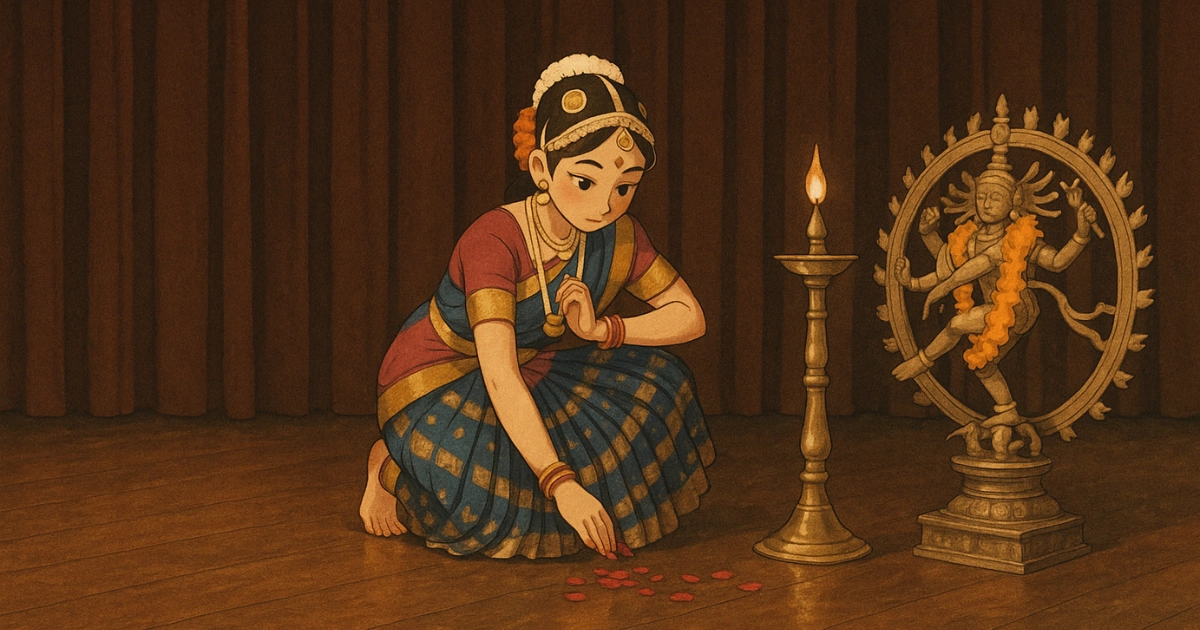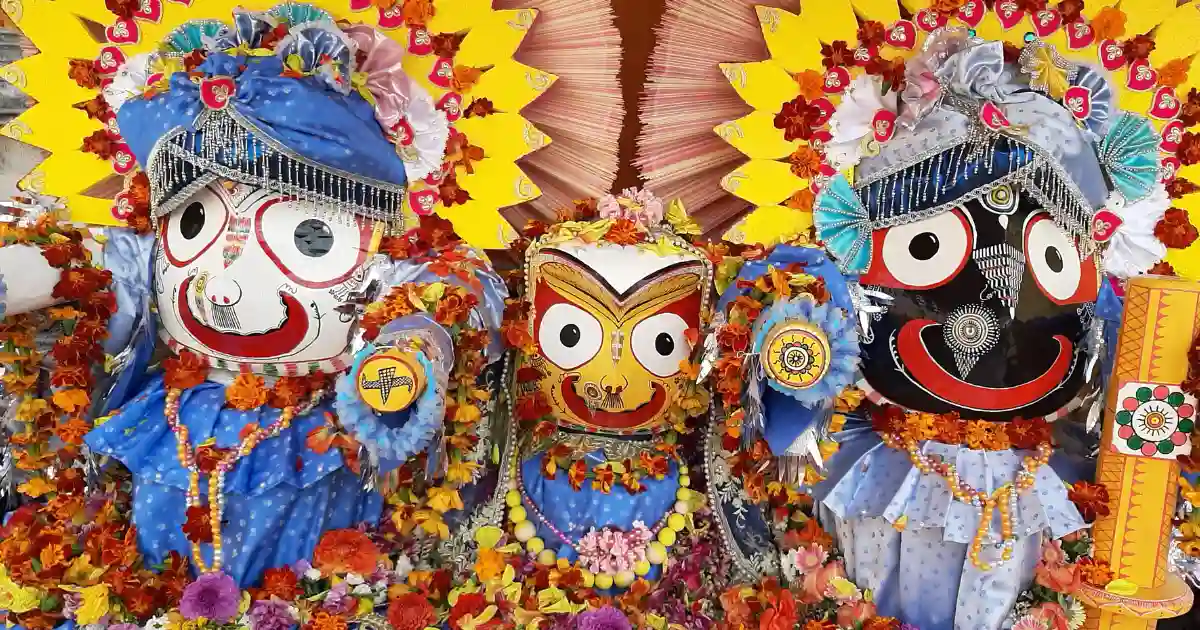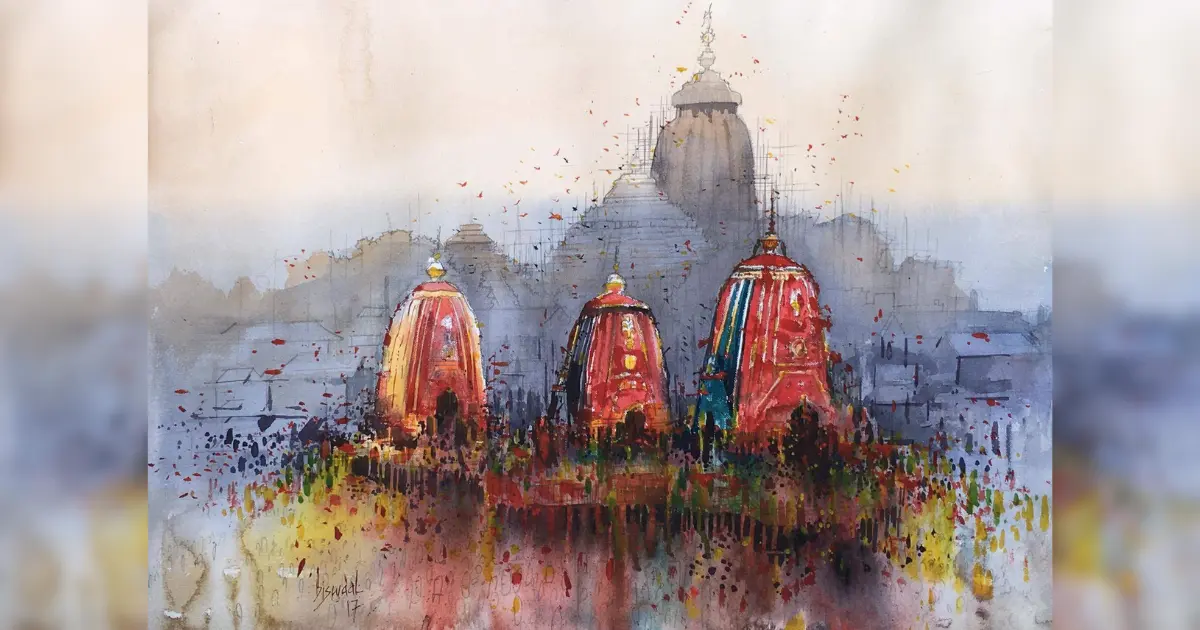Just like all life on this earth, thoughts germinate from a seed-like idea. I call it a thought seed. This idea is inspired by a seed ball, where a number of seeds are enclosed in clay and when this seed ball encounters favourable conditions such as the availability of water and good soil it will begin to germinate and sprout new life. Similarly, the following questions can remain with you and germinate whenever favourable conditions are with you.
Thought seed:

Think deeply!
Do cows and ghee have anything common? Do we routinely see the ghee in milk? Do we identify ghee in set curd? How does ghee come from heating butter? Where was the ghee hidden? When water, soil, and the mango tree do not look like mangoes, how can a seed hidden inside a mango sprout a mango tree? How did the sweet water reach the height of the tender coconut in a tall tree without a pump or electricity? If a woman eats a banana for a meal it takes on the qualities of a woman and in that sense, becomes a woman, but if a monkey eats the same banana it becomes a monkey; how is this possible? If a black cat and a white cat can play with each other without hatred or racism, why can’t humans do the same? What differentiates humans from other species and how are we superior? Think deeply about your lives and the lives of people that you know from these perspectives.
Instruments:
We are aware of instruments like thermometers, barometers, pedometers, and odometers that measure various things scientifically and give us readings. The readings on these meters help us decide what steps to take if the readings are not normal and sometimes control our future actions. These readings also help us gain insights into our current status, such as body temperature, vehicle speed or barometric pressure. But, do human beings have the capacity to function as an assessment tool? My answer is a clear yes, though I suspect that these days some of us are becoming more dependent on instruments for such readings.
My grandmother very often knew from the very look on my face if I was hungry or bored or if I was sick. She was also a walking-talking-meter of many other things. Many conscientious mothers today are even installed with a mother-o-meter where they know most things about their children. Elders and/or caretakers those days inspired the young ones by telling a lot of stories in order to drive a point home to the kids. This is because parents and care-takers have the duty to take care of the kids’ physical and emotional, psychological well being. This is best done through stories.
I was fortunate to listen to many stories from my maternal grandparents and uncles every night about various historical events from our texts like śrīmadbhāgavatam, śrīrāmāyaṇam, and śrīmahābhāratam. Sometimes my grandmother, would tell me historical stories of many śrī vaiṣṇava divyadeśams. She would offer discourses in various temples on invitation. I have trodden along frequently with her for these discourses.
My upbringing and the great gurus and ācāryās that I met or heard or worshipped in my adult life have made me into a true sanātana dharmī. These experiences have not only changed my course of life but also altered my outlook. I now feel that listening to these stories and discourses enabled me to become one, with the activation of the dharma meter installed inside my head.
All of us need to reactivate and upgrade the dharmameter that comes preinstalled in the human body. It is like churning out the butter in the curd. Someone is a sanātana dharmī, only if every action of ours is measured by our own dharma meter. I use this word ‘meter’ in the sense of a scientific instrument because we can actually measure our actions using our dharma meter. Unlike what Macaulay recorded in his banal minute, our sanātana dharma and its construals are based on pure sciences. The word 'dharma' is one of the most difficult words to decipher. Everyone seems to know what it means, but do we really understand it?
Let us try to understand the word as applicable to this yuga, the kaliyuga from a common person’s perspective.
Dharma:
The word dharma is defined as “an individual's duty fulfilled by observance of custom or law” in the Merriam dictionary. But, the questions we need to ask ourselves are: Whose custom? What or which laws? Westerners will not be able to answer these questions without referring to our śāstra pramānās. Even if we take that definition at face value, we need to understand that dharma always results in doing what matters for the larger community over our own individual comforts. The term that we need to define this attribute is paropakāram or hitam, that which is beneficial to a larger community's well being, where all of us can peacefully coexist. Except in the case of a demoniac action by someone or some group that is detrimental to the society at large, dharma focuses on peaceful coexistence.
Svadharma is often seen as one's job, or a role that is assigned to the body that we occupy and its relations thereof. For instance, someone could hold the job of a teacher; then his or her svadharma is to show the path that will be instrumental in creating a set of students that walk the path of dharma, that would create a beneficial living condition of peaceful coexistence for those students in their own lives. Such a teacher then is the role model for all her students. This job holds within itself the possibility of constructively inspiring a whole generation. She must first live the role to the best of her abilities before becoming the role model. This becomes her dharma.
Nevertheless, the word ‘dharma’ is one of the most difficult concepts to define.
Some equate this word to religion which is a very microscopic way of defining it. But the reality is that it is beyond any kind of religion. And such a perspective is unique to sanātana dharma, which is not only a religion but also a way of life. We also know that it is the first ‘puruṣārtha’ of the four puruṣārthas , the other three being, ‘artha, kāma and mokṣa’. There are various references to this term in many of our granthās including the upaniṣads. But, before we attempt to understand it, we need to look at our human body and understand the differences between us and other species, be it animal or plant.
Other species are born, they eat, grow, reproduce and die one day. Many of us also lead our lives in such an existential mode. Sometimes we are more ‘animalistic’ than animals in our vicinity. Humans commit atrocities against one another. We also tell lies and take great pride in our mundane achievements. Interestingly, none of such ‘crimes’ are committed by animals; no animal tells lies, or takes pride in having built a lovely nest; we only have to think of the weaver bird. These atrocities committed by human beings are definitely not an animal attribute. For want of a different word, we are forced to label such attributes as animalistic, though it is actually an insult to the animal kingdom.
As human beings we are also seen throwing stones or a stick at street dogs, even when they have not harmed us. Dogs do not attack other dogs without a reason. We see a plant by the wayside, and often, we just strip a small branch of its leaves for no valid reason, and throw it away and go our way. No animal does this: if a goat reaches for the leaves of a plant it is only because it is hungry and needs food. As human beings we carry enmity and jealousy in our hearts: no animal is jealous of another animal: no tree is jealous of another because it gives more shade or has more branches.
If we lead a mere existential life which is less than that of an animal, because we fill our hearts and minds with jealousy and hate, then do we stop to understand that all other species on this planet earth actually lead a more peaceful existence, for it is a life without the negative qualities that our minds get filled with and which occupies all our time?
A better job, a better car, a bigger house, these wishes and hopes preoccupy us. All this means that we have forgotten the basic dharma of the human body that we occupy. We have forgotten to add the humane attribute to everything we do and live only by existential needs to keep ourselves alive and ‘safe’. Such a life is not natural to us and is against the dharma of the human body. We have forgotten the magic and the possibility of the human body, that is endowed with thinking capacities, going beyond instinct and controlling them. Unfortunately, many of us have lost this connection and are caught in the rat race of money-making.
Many of us live as though we are born to pay bills and then we die. Is this all that is to it and is this our purpose in life as humans? What do we do with our lives? How are we different from the other species on this planet earth that we call ourselves superior? We spend a lot of time and energy amassing wealth, putting it in banks, guarding it to pay insurance, keep counting the interest we get, trying to spend our money cautiously, or saving it for future generations and then we die. But, an existence on planet earth has been the norm for all other species without the intervention of any kind of wealth. They are born, they live, eat, hunt if needed, forage for food, mate, give birth, look after their young ones, and eventually die. No wealth is passed on, except survival skills.
A dog lives a dog’s life, a bee lives its life of building and living for the beehive. What about us humans? Do we live our human life humanely? A dog, camel, mango tree, bug, mosquito all live without the intervention of money or bank accounts or clothes or homes in their lives. How do they do that? Why is it that humans are so worked up with the concept of money? How is it that every other species has no such requirement but we spend our lifetimes on our livelihoods? We need to address this question first to find out the specialty of the human body that we occupy and what our duty is in this body. There are several answers, and it is imperative that we go beyond mere instinctual or compulsive existence to use the human body wisely.
The blessings bestowed to human existence include intellect, the ability to traverse among the past, present, and future, plan for the next decade, execute those plans, etc. But we abuse such faculties and denigrate them with jealousy, stress, worry, greed, anger, idiocy, hatred and much more, and these cause us to go below the level of animalistic or plant-like existence.
Have we heard of a mango tree that bears 2600 mangoes being jealous of its neighbour tree that might give out 2800 mangoes! Similarly we do not know of white dogs making fun of a black dog. They all seem to peacefully coexist without hatred or jealousy and that too without any bank account or a school/university ‘education’ or a job. But, most humans nurture their intellect to fill themselves with all the faculties that make sure that peace is dismissed from their lives, where the intellect works against them rather than for them.
Firstly, we need to understand mānava dharma or the nature of human existence. There are no answers or a clear cut pathway prescribed in any other geographic place or religion other than Bhārat and sanātana dharma to this existential query. We are the masters of this vidyā and we have pursued this since ancient times. Unfortunately, owing to the Macaulayan system all this got left behind, and we were taught to respect only that type of education which helped us acquire livelihoods, that removed us from our natural setting and learning that we were so successful in. Our traditional teachings and learnings are brilliantly reflected for example in the various sculptures in temples and the water conservation systems in the form of temple tanks. Without a highly evolved system of education that encompassed the environment, culture etc., such sculptures and such amazing water systems would not have been possible. The British education system categorically broke our cultural and our traditional education systems, we have lost our connection to our past, so much so that we started using the words traditional or tradition in a very negative sense, with a sense of shame.
Our sanātana education system taught us to live usefully while celebrating human birth and ensure that we reach the fourth puruṣārtha, that is mokṣa. It is a proven fact that the human body is a vessel that can easily teleport us from the clutches of the birth-death cycle. Sadly, due to the pursuit of livelihood we have turned ourselves away from such high possibilities that this human body offers us. We come with a preinstalled dharmameter if we are born in Bhārat and if we are raised with bhāratīya saṃskṛti. It is this dharmameter that will churn us in this human life to separate the smooth butter that is hidden inside milk. Sometimes in lay man’s terms it is called a ‘gut feeling’, but in reality it is a glimpse of the dharmameter that is activated.
Let me give you an example. In one of the courses that I taught, (I teach undergraduate, post graduate and doctoral level courses in an autonomous university), there was a student (Shankar -name changed) who was very focussed on his studies. But there were some days when he came late to class. The first time this happened, I ignored the delay and permitted him inside with a slight chiding that he needed to respect time and come on time. A week later, it so happened that he had arrived 30 minutes late, again, and was profusely apologetic and promised never to be this late ever again. The next day, he was again 35 minutes late to class. I reminded him gently that he had promised never to be late. He apologised again. The fourth day he was again late by 30 minutes! I wanted to scream at him; one part of me was forcing me to do this to him. But, another part of me looked at his apologies and his steadfastness and contribution in the classroom teaching-learning transactions and told me to wait and look for constructive alternatives. I listened to this part of me and ventured to get to the root of the matter. In the same institution there are professors who deny entry to students even if they are 3 to 4 minutes late to class! We know of teachers who lock the classroom door as soon as they start their class and then begin teaching. They take great pride in their punctuality. Some other teachers would loudly shame such students, while others would reduce their internal marks. Punctuality is a good practice in the general sense, and needs to be nurtured. But in this case it had caused a confusion in me and it did not seem like a deliberate delay as Shankar was very active in class in spite of being late. Something told me that I had to handle this case of non-punctuality carefully and without prejudice, bias or egotistical authority. I knew I had to be dhārmic in this context.
I had heard through various dhārmic sources that it is always the intention behind the act that is more important than the act itself. The act, in this context, was Shankar coming consistently late to class. This act, however unwelcome it seemed, was coupled with his positive involvement in class. This contrast in the act was a bit confusing to me. Dharma came to my rescue, where it was mandatory for me to get to the root cause of the unwelcome act, because being late to any committed class or place is not a dhārmic practice. So, I called Shankar in private and asked him what caused the delay on a regular basis. He told me that the class previous to this one was in a geometrically opposite place in the institute and that the professor on a regular basis overshoots his timetable hour by a few minutes and Shankar did not have the nerve to walk out of that class. Furthermore, Shankar did not have a mode of transport and so had resorted to taking a jog to my class in scorching heat, even skipping lunch, if he was unable to hitch a ride with someone. Additionally, Shankar confessed that he suffered from panic attacks and was on medication, he had not let any teacher know about it. He had missed many other classes in other subjects and had to plead in vain to be admitted into other classes. This made him take more and more medication to avoid panic attacks. He recounted that many teachers had yelled at him in front of his classmates for his ‘crime’.
Shankar had found a teacher in me that ‘gave him his space’ and even ‘bothered to ask’ what caused the delay without prejudice. This small act changed the course of his life (in his words), because he was on the verge of dropping out of the entire programme. It helped him acquire a degree, this being his final semester.
Now, what was it that I had done? I had not displayed any greatness but simply applied dharma to a problem that I was facing and went by what my dharma had taught me.
This, I had learnt by watching and observing the elderly and my gurus. My dharmameter, enabled by my pāṭi, and reactivated by my guru, pleaded with me that I should not be judgmental towards people, that I must hear their side of the story. It steered me towards finding out the rationale or the root cause for the problem that Shankar was facing.
I tried to be a humane teacher. This has everything to do with being humane as this is human dharma, beyond all labels. The necessary label here is that the human being needs to be humane, to rise above the animalistic existence, by being gentle with fellow beings. This is what makes a human being vertically different from an animal.
We may say, well, what is so great in asking for an explanation from Shankar, everyone does it. No, not every teacher around Shankar was kind to him. His life in the institute had become unmanageable and he had not seen a ray of light as every teacher found fault with him where it was not his fault. No one bothered to ask him why he was late nor did they care if he had had lunch. This one humane act saved his undergraduate degree for him, though it did not seem like a big deal then. Shankar is settled in a bank job now. That one dhārmic act saved his future. The dharmameter in me was active and prevented me from becoming egoistic or resorting to power play. My dharmameter doused such negative tendencies with the stories of destruction of people who had fed voluptuous meals to their egos like rāvaṇa or hiraṇyakaṣapu. Thankfully, my pāṭi had cautioned me against feeding this rākṣasa called the ego aeons ago and I remembered it at the right time.
Let us look at one more example. A colleague of mine, called me to her office room around 3.30 p.m. one afternoon and asked for a lot of details about articles I had written, workshops conducted etc., over the past five years, and for them to be sent to her as an email. She wanted it in just half an hour, by 4.00 p.m. sharp! I told her that it would be difficult, and asked if I could send it the next morning because I had to open a lot of old files to gather the said information. She vehemently asserted that the details were needed that evening itself. I told her therefore that I would send it as soon as I could. It took me an hour, and with great difficulty I managed to send it to her by 4.30 p.m. and since she said it was very urgent, I went into her room to inform her about it. Instead of a thank you, I got an earful of yelling and scolding as a reaction such as, “You are stupid: all of what you do is stupid. You know nothing” etc. All that was for a half hour delay. The lady was either egotistical, or was upset about something else, because for the life of me, I could not understand why she had yelled at me in that manner.
As any normal human being would, I could have yelled back and told her that what she asked for was difficult and that I had bent over backwards to furnish the details she had asked for, in the format required. The dharma meter in me woke up as usual. Yes, it was difficult to digest this unwarranted yelling as I had done nothing wrong. I, for sure, did not want to yell back. I just said: “Is your health okay? You seem to be preoccupied about something. I will come and talk to you tomorrow” to which she said that there was nothing wrong with her health. Then I knew that she relished rebuking me, so I said to her with a broad smile, “Oh! Then it seems that calling me stupid is pleasurable to you, do not worry, I am not going to be hurt by these labels, rather, if it gives you pleasure, I permit you to call me anything you fancy!” This left her speechless, but most importantly it kept me peacefully happy as my dharmameter had saved me from anger, bitterness and kept me as cool as freshly churned butter. The situation had churned my insides for a wee bit, but then with the dharmameter, the churning yielded its butter, and took me off to the childhood pastimes of lord Krishna along with some bhajan singing, while this colleague of mine looked like she had just swallowed a cricket ball while trying to hit me with it!
We have to ask ourselves two different questions about my colleague’s reaction and my response. First, what made the lady yell in that manner? Did she pause to think of what she was doing, and whether she would have liked it if someone else had yelled at her like that? Second, what made me reply in a calm manner. Someone could state that this is nothing new, and that many others also could have stayed calm, cool and collected. Maybe so. I am not saying that I am the only one who has responded in this positive calm manner, but many others also would have reacted by getting upset, or by being angry or hurt. I chose not to react but respond neutrally and constructively.
Such a response, for me, is because my dharmameter is active and I think before I speak, and also think of what the consequences of what I say will be. What is the effect of what I say on the listener is a question I try to ask myself every time. Dhārmic speech is always listener centered.
Let the dharmameter function in you like the butter churner and help gather the goodness, the way butter collects in the vessel when curd is churned. The butter, or goodness, is inside all of us but is often not visible the way it is not visible in a pot of curd.
A dharmameter is what helps us churn our minds so that good thoughts and words emerge, like soft white pure butter.
Reference:
- Merriam-Webster. (n.d.). Dharma. In Merriam-Webster.com dictionary. Retrieved September 6, 2023, from https://www.merriam-webster.com/dictionary/dharma






